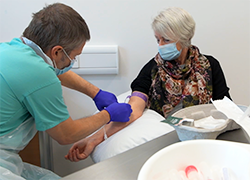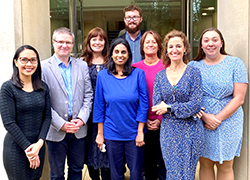
The University of Cambridge is part of the International Alliance for Cancer Early Detection (ACED), a science-led, collaborative investment of £55 million between Cancer Research UK, the Canary Center at Stanford University, the University of Cambridge, the Knight Cancer Institute at OHSU, University College London and the University of Manchester.
The purpose of ACED is to unite world-leading researchers to tackle the biggest challenges in the early detection of cancer, an important area of unmet clinical need. Please see the pages below for further information.
- Funding calls for collaborative projects and travel between ACED member centres will be announced regularly and detailed on our funding page. Cambridge researchers should read this Briefing note.
- Current ACED projects involving Cambridge will be listed on our research projects page.
- See our events page for ACED networking events and other opportunities.
ACED in Cambridge
Led by Professor Rebecca Fitzgerald, the Cambridge ACED member centre is leveraging the success of its Early Cancer Institute to bring world-class facilities and early detection expertise to the wider Alliance. Central to this is the development of ACED Clinic Cambridge, which will provide Alliance members with the resources and infrastructure required to conduct first-in-human clinical testing of novel diagnostics and imaging devices.
PIs at Cambridge University can become a member of the ACED Cambridge Centre by contacting info@earlycancer.cam.ac.uk
ACED Members can join the ACED Online Community to connect with researchers at other Centres and be involved with ACED opportunities. To receive an invitation to join, email ACED@cancer.org.uk.
ACED Clinic Cambridge
The mission of ACED Clinic Cambridge is to provide world-leading resources for all Alliance Centres to enable first-in-human clinical trials for early cancer detection to establish feasibility, acceptability and cost effectiveness of new diagnostics and early interventions.
Read more >
ACED Funding
There are a number of different awards available through ACED. Please visit the ACED Funding page for more information.


